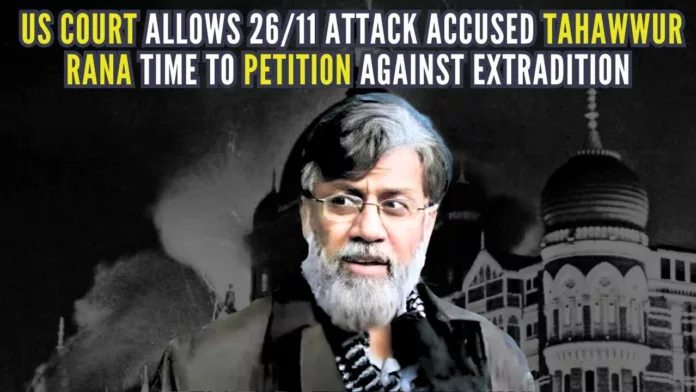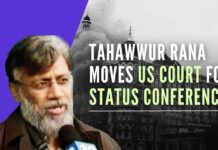
Mumbai terror attack accused Tahawwur Rana allowed more time to challenge extradition
A federal US court has allowed Pakistani-origin Canadian businessman Tahawwur Rana time till November 9 to file a motion against his extradition to India to face a trial in the 2008 Mumbai terror attack. In August, Rana, 62, had appealed before the Ninth Circuit Court against the order by a US District Court in the Central District of California that denied the writ of habeas corpus. The Ninth Circuit Court on Tuesday agreed to his request for more time to file his motion which was initially set for October 10.
According to the latest court order, Rana’s brief is now due on November 9 and the government’s answer will be due on December 11, 2023. Earlier on August 18, the court had granted Rana’s motion for a stay of extradition so that his appeal could be heard by the US Court of Appeals.
Rana, who is currently detained at the Metropolitan Detention Centre in Los Angeles, faces multiple charges for his role in the Mumbai attacks and is known to be associated with Pakistani-American terrorist David Coleman Headley, one of the main conspirators of the 26/11 strikes. Following his request, Judge Fischer from the US Court of Appeals for the Ninth Circuit had asked Rana to submit his argument before October 10 and the US government was asked to submit its response by November 8.
Judge Fischer wrote that Rana has shown that he is likely to suffer significant irreparable harm absent a stay. He will be extradited to India for a trial on serious crimes with no hope for a review of his arguments or hope for his return to the United States. The government admits this but then argues that because “this claimed irreparable harm applies categorically to any fugitive who seeks a stay of extradition pending appeal,” it does not count, the judge had said.
Earlier, US attorney John J Lulejian had appealed before the district court to deny Rana’s ex-parte application for a stay of extradition pending appeal and argued that the stay would cause “unwarranted delay” in the United States’ fulfillment of its obligations to India and this will damage its credibility in the international arena and impair its ability to obtain the cooperation of foreign nations in bringing United States fugitives to justice.
Rana, he argued, cannot show a likelihood of success on the merits of his claims or otherwise meet his burden of justifying a stay. “Accordingly, the United States respectfully requests that the court deny his ex-parte application,” the US attorney wrote.
Lulejian argued that the district court should deny Rana’s request for a stay for the threshold reason that he has failed to demonstrate that he is likely to obtain a reversal of this Court’s decision in the Ninth Circuit. In his ex-parte application for a stay, Rana has made no showing whatsoever, let alone a strong showing, that he is likely to succeed on the merits of his appeal, he argued. Indeed, he simply states that he seeks a stay “to permit his non-bis in idem argument to be heard by the court of appeals.”
A total of 166 people, including six Americans, were killed in the 2008 Mumbai terror attacks in which 10 Pakistani terrorists laid a more than 60-hour siege, attacking and killing people at iconic and vital locations of Mumbai. India’s National Investigation Agency (NIA) is probing Rana’s role in the 26/11 attacks carried out by terrorists of the Pakistan-based Lashkar-e-Taiba group. The NIA has said that it is ready to initiate proceedings to bring him to India through diplomatic channels.
[with PTI inputs]
For all the latest updates, download PGurus App.
- Supreme Court rejects plea to tally all VVPAT slips with EVM votes; says ‘no going back to paper ballot’ - April 26, 2024
- US report citing human rights violations is deeply biased: India - April 25, 2024
- Kotak Mahindra Bank shares tank 13%. Market Cap erodes by Rs.37,721 cr post-RBI action - April 25, 2024











Too late & null value